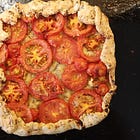The Freedom of Cooking Terrible Food as a Young Adult
Freedom we could do with as we get older
I’m in the middle of writing an in-depth food and wine guide to Rome (hopefully dropping on Friday for paid subscribers) so it’s a quick, thought-processy kind of post today, but an important thought process nonetheless.
Last week, the excellent
recently asked her subscribers what was the very first thing they learned to cook for themselves.The comments section—of which I added my first-year college staple of frozen ground beef, jarred sauce, penne pasta and grated cheddar — lit up with everything from inedible apple pie to pimped pre-cooked rice pouches.
Almost all the comments had something in common — the food sounded terrible. Most of us it seems, hit early adulthood hardly knowing how to cook.
There was something else too — the desire to “put your own spin” on food. We were using food as a form of self-expression as well as learning through trial and error.
I’ve thought a lot about this this week, about how food was a discovery back then. Freed from the shackles of eating with families — thus often being at the mercy of what our parents could cook — we fucked about with our food. We added things that probably shouldn’t have been added to dishes just to see what they would taste like.
Like when in college, my brother thought hey, I wonder what happens if you blitz pea risotto in a blender?
It wasn’t great. But at least he tried.
As adults, we run the risk of losing that self-expression. Food becomes just another thing to think about. Get it on the table, get your kids fed, don’t think too much about it and certainly don’t let it go wrong, ain’t no one got time for that.
And few of us are creative in the kitchen. A quarter of British adults only know how to cook three dishes. Only 40% can cook more than nine.
This doesn’t exactly scream FREEDOM! CREATIVITY! SELF-EXPRESSION!
Yes, there are many reasons why this happens. Not least is the systematic breakdown of support systems that renders us marooned on our own personal island (or indeed, house) with barely enough time to sleep, let alone muck about in the kitchen.
But still, I would love to see more people get back to that time in their lives when food was a discovery. To a time when they didn’t think too much about adding sweetcorn to a mac ‘n’ cheese. They did it just to see what would happen.
I’ll be writing more about this in the coming weeks but I’m interested in how recipes and recipe books contribute to our nervousness about being creative in the kitchen. After all, according to the above article, the reason we Brits hardly cook — aside from an unwillingness to waste ingredients— is that they’re worried the recipe will go wrong.
My theory is that many recipe books hinder much more than they help this subject because, in the recipe developer’s desire to “put their own spin” on food, the recipes become over-complicated.
I’ve noticed this trend more and more. Every recipe book I got for Christmas makes everything sound so convoluted. They all contain an overwhelming list of ingredients and steps.
Even as a freelancer who literally develops recipes for a living (at least part of that living), many of these recipes take too much time and effort to make. I’m someone who considers a recipe a starting point (I don’t think I’ve ever followed one to a T) but even I can’t break down some of these recipes into something I can realistically cook.
If recipes are super complicated or use ingredients you can’t get your hands on (or can’t use because of dietary restrictions), they become a hindrance to creativity. A hindrance I’d hazard few of us had when we were bright young things doing weird shit in our college kitchens.
Perhaps this is nostalgia. Perhaps I’m yearning for a time before smartphones, social media, and before everything got so complicated. Including our food.
But I do think there is something to be said about the beginner’s mind nature of those early cooking years. Despite having little money, terrible knives, and in my case, an overreliance on the George Foreman grill, I had freedom in the kitchen that I sometimes miss in my attempts to make restaurant-grade food today.
There’s no doubt these early dishes formed who I am today, whether I took them through to adulthood (bacon, pea and mint pasta) or not (Old El Paso tortilla kits). I’d never be doing what I do for a living without cooking back then on an ancient gas stove in my college houseshare.
So here’s to the simplicity of early adult cooking. To the self-expression of putting together weird ingredients. To what it teaches us as we get older.
And here’s to more experimentation in the kitchen.
Even when it goes wrong.






A roommate at college on first time cooking rice, cooked the whole packet. By the time it was ready, ALL of our meager supply of saucepans were full of cooked rice and sitting all over the flat.
https://eatdrinkjourney.substack.com